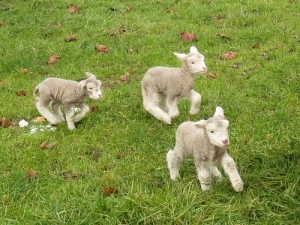Move over ham, here comes lamb
It’s official, lamb will take centre stage on Kiwi Christmas tables this year.
 BLNZ's Lamb Crop 2015 report estimates 23.9 million lambs were tailed this spring – the smallest lamb crop since 1953.
BLNZ's Lamb Crop 2015 report estimates 23.9 million lambs were tailed this spring – the smallest lamb crop since 1953.
White the lamb crop is the lowest since 1953, sheep farmers have become much more productive, says Beef + Lamb NZ chief economist Andrew Burtt.
He says there is still constant tension and pressure to improve efficiency and productivity.
"Farmers have responded to the signals from processors about lambs in tight specifications. That sort of thing will just continue," he adds.
BLNZ's Lamb Crop 2015 report estimates 23.9 million lambs were tailed this spring – the smallest lamb crop since 1953. Lamb export receipts for 2015-16 are estimated at $2.8 billion, down 4.2% on 2014-15.
Burtt says demand, overseas markets, currency rates and interest rates are constantly moving factors that farmers do not directly control.
"Their best focus is on the things they do have some control over, which is their productivity in getting the weights desired by their customers, the meat companies. They're doing the best they can do as efficiently as possible."
The overall focus is an increasing demand to grow animals to specifications.
He says sheep numbers fell because of key factors like drought; and dairy cows are expected to have the first noticeable downturn in a long time – driven by prices and drought. However, the decline in beef cattle numbers has slowed substantially.
"But sometimes we miss the story if we focus solely on the number of sheep or beef cattle," Burtt adds.
"We miss the productivity improvements through farm management and pasture management; all farmers know about El Nino and make and implement their plans to deal with El Nino should it eventuate.
"There are some [farmers] in Hawkes Bay who say it has rained so much at present that 'if this is El Nino bring it on'. Nevertheless they are working on the prospect of dry conditions later in the year.
"I think that responsiveness and resilience to these sorts of things is getting stronger and stronger in the industry, nevertheless there are still improvements in confidence needed."
Regarding the Silver Fern Farms investment by the Chinese company Shanghai Maling, Burtt says it shows there is enough confidence in the industry for people to invest in it.
New DairyNZ research will help farmers mitigate the impacts of heat stress on herds in high-risk regions of the country.
Budou are being picked now in Bridge Pā, the most intense and exciting time of the year for the Greencollar team – and the harvest of the finest eating grapes is weeks earlier than expected.
The Real Estate Institute of New Zealand (REINZ) has released its latest rural property report, providing a detailed view of New Zealand’s rural real estate market for the 12 months ending December 2025.
Rural retailer Farmlands has released it's latest round of half-year results, labeling it as evidence that its five-year strategy is delivering on financial performance and better value for members.
OPINION: "We are back to where we were a year ago," according to a leading banking analyst in the UK, referring to US president Donald Trump's latest imposition of a global 10% tariff on all exports into the US.
DairyNZ says the Government’s proposed Resource Management Act reform needs further work to ensure it delivers on its intent.

OPINION: A mate of yours truly reckons rural Manawatu families are the latest to suffer under what he calls the…
OPINION: If old Winston Peters thinks building trade relations with new nations, such as India, isn't a necessary investment in…